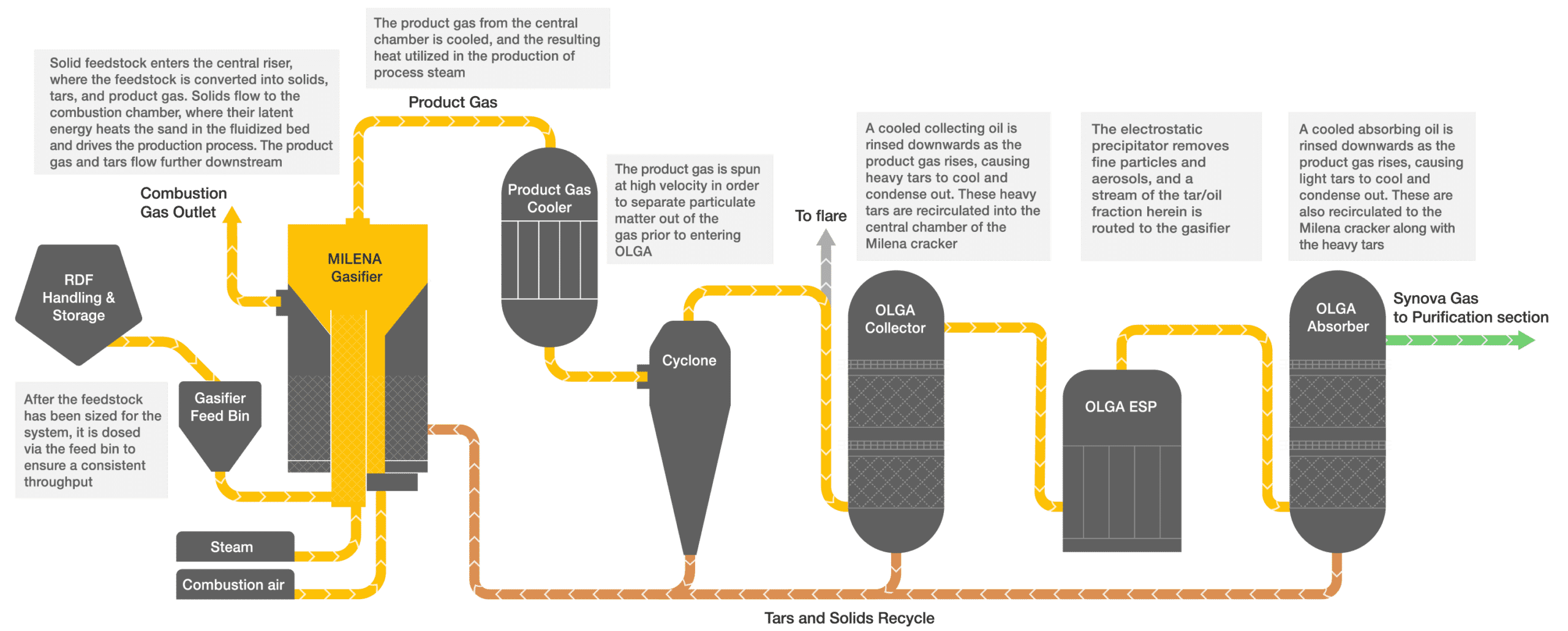Synova’s technology enables a global transformation for our society.
Time for Transformation
Transition to a more circular economy.
As the plastics industry struggles to move from a linear model to a circular one, Synova’s technology enables us to divert waste from landfills and close the loop on the plastic supply chain through a continual use of resources. Our patented thermochemical recycling process breaks down previously unrecyclable materials like mixed and dirty plastics to its basic building blocks. These high value molecules can then be used to create new plastics, displacing the need for virgin materials and reducing the carbon footprint that comes from harnessing those materials.
Transition to a more sustainable energy future.
Synova’s technology produces high-quality syngas that have a variety of applications. In addition to creating the building blocks for new plastics, Synova’s technology can process biomass and other forms of waste to produce sustainable fuels in the form of renewable natural gas (RNG) and synthetic natural gas (SNG). It can also produce electricity. Regardless of the output, Synova’s highly efficient process displaces the need for fossil fuels and other forms of carbon.
Transition in the way we manage waste.
By transitioning from a linear to a circular economy, waste is no longer a cost to society but instead something that has economic value. Instead of paying to incinerate or landfill our waste, Synova’s technology can process dirty or mixed plastics that aren’t suitable for mechanical recycling. Because they don’t need to be separated or washed, Synova’s patented process is economical and requires less effort. The technology harvests the high value molecules (primarily carbon and hydrogen) for a variety of applications from new plastics to sustainable fuels and electricity. Even the energy value of the tars removed in Synova’s superior gas cleanup train is injected back into the process to ensure every bit of value is squeezed from our trash.
Our Process – How It Works

Key Differentiators
Synova’s technology solves 3 main barriers that have hindered the widespread commercialization of competing technologies:
Feedstock Flexible:
Synova’s technology can accommodate a wide variety of feedstock ranging from waste and agricultural residues of any size. When processing MSW, plastics do not need to be separated and MILENA-OLGA can accommodate mixed and dirty plastics that are unable to be processed through mechanical recycling.
High Value Molecules:
MILENA-OLGA produces a high-quality gas, rich with valuable compounds. These compounds can be harvested as chemicals and used as the basic building blocks for new plastics. The calorific value of the gas makes it suitable for upgrading to renewable fuels (RNG/SNG) and for utilization in turbines.
World Class Gas Cleanup Train:
Tars have long been the Achilles Heel of the industry, known for fouling due to condensation and creating high costs and investment for maintenance and cleaning of equipment. OLGA removes 99.5% of tars and uses it as a feedstock for MILENA. This completes a highly efficient process in which there is no tar waste stream.
Feedstock Flexible:
Synova’s technology can accommodate a wide variety of feedstock ranging from waste and agricultural residues of any size. When processing MSW, plastics do not need to be separated and MILENA-OLGA can accommodate mixed and dirty plastics that are unable to be processed through mechanical recycling.
High Value Molecules:
MILENA-OLGA produces a high-quality gas, rich with valuable compounds. These compounds can be harvested as chemicals and used as the basic building blocks for new plastics. The calorific value of the gas makes it suitable for upgrading to renewable fuels (RNG/SNG) and for utilization in turbines.
World Class Gas Cleanup Train:
Tars have long been the Achilles Heel of the industry, known for fouling due to condensation and creating high costs and investment for maintenance and cleaning of equipment. OLGA removes 99.5% of tars and uses it as a feedstock for MILENA. This completes a highly efficient process in which there is no tar waste stream.
